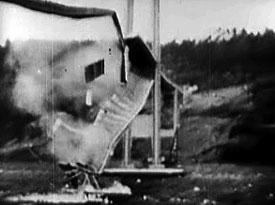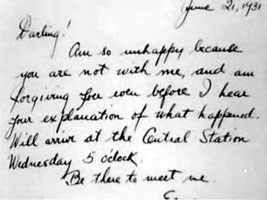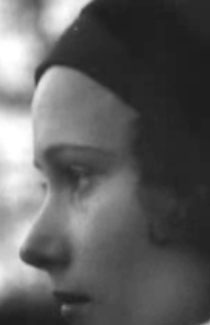In 1998, the silent documentary film footage dubbed The Tacoma Narrows Bridge Collapse (1940) was added to the National Film Registery of American films of cultural consequence.
 The National Film Preservation Board really impresses me in identifying such tiny films as this, as it really is culturally significant here in the Pacific Northwest, where the footage is better known by the pet-name for the fallen bridge Gallopping Gertie. The National Film Preservation Board really impresses me in identifying such tiny films as this, as it really is culturally significant here in the Pacific Northwest, where the footage is better known by the pet-name for the fallen bridge Gallopping Gertie.
So-named long before it fell, due to its wobbles & sways, it was only mildly surprising to local residents that the unsteady suspension bridge did eventually collapse into the deep waters of the Narrows far below.
Living in Washington state not far from the Narrows Bridge, I've been exposed & re-exposed to the famous film footage throughout my life without even trying. I've even recognized it, unidentified, spliced into movies & television shows. Though originally filmed in Kodachrome, I've only ever seen it in black & white, which seems to be the only way it is circulated.
Attempts to save the black cocker spaniel Tubby failed because of its terror & unwillingness to leave the car, but there were no other casualties. The dog's owner, Leonard Coatsworth, abandoned his car as the bridge heaved up & down, & literally crawled his way from the bridge, for the buckling was too much for him to walk. His car is visible in the footage plunging into the water.
Today the collapsed bridge way down at the bottom of the narrows is protected by law from salvagers, & has become an artificial reef rich in saltwater wildlife.
Black Dawn (1933) is a short film of harsh rural realism, beautifully photographed. A young woman (Julie Handon) is fond of a drifter (Frank Eklof), putting her in conflict with her ill, gruff father (Ole M. Ness).
There's a tragic, depressive tone to the daughter & father's characters, right from the opening scene. Dad's sinister jealousy is demented even before a third character enters the scene.
The daughter has a sunken worn-down aspect from caring for the farm without her father's aid. We might suspect worse from the menacing bastard's years of control & emotional cruelty.
With minimal dialogue it approaches being a silent film. And when the young man appears on the horizon, the young couple getting to know one another & falling in love by the haystack is done entirely without speaking.
The father seemingly softens toward the young man & the daughter wells with hope. Sleeping on the floor in the father's room, the young man rises long before dawn & slips from the room not knowing the father is awake.
The lovers are in each others' arms when the father catches them. In the resulting uproar, his daughter informs him, "If he goes, I'm going with him," only to be told, "Well then, git out! Git!"
 Pa panics & his daughter full of guilt tells her lover she has to care for the old man. The drifter will be long gone before she realizes her father is dead. Pa panics & his daughter full of guilt tells her lover she has to care for the old man. The drifter will be long gone before she realizes her father is dead.
Autumn Fire (1930/33) is a quarter-hour or so film created almost as a love-sonnet by Herman G. Weinberg as kind of a marriage proposal. And it indeed won him a wife.
It's silent but for music by Lee Erwin, & evocative of loneliness in a world of nature's beauty, trees, & rippling water. This world is being observed from a window by an unsmiling beautiful woman (Erna Bergman).
The rapid-fire jump-cuts eventually take us from countryside to sharply contrasting city scapes, which are observed by an equally lonesome young man (Willy Hildebrand).
The lone woman is seen walking down a country road; the lone man on a harbor pier. It continues rather redundantly, cutting between the two environments, & is intriguing for about half its length, though dull before it's over.
Personally I couldn't care less about either character who eventually we discover are lovers separated by some disagreement, but reconciled by the end.
copyright © by Paghat the Ratgirl
|

 The National Film Preservation Board really impresses me in identifying such tiny films as this, as it really is culturally significant here in the Pacific Northwest, where the footage is better known by the pet-name for the fallen bridge Gallopping Gertie.
The National Film Preservation Board really impresses me in identifying such tiny films as this, as it really is culturally significant here in the Pacific Northwest, where the footage is better known by the pet-name for the fallen bridge Gallopping Gertie. Pa panics & his daughter full of guilt tells her lover she has to care for the old man. The drifter will be long gone before she realizes her father is dead.
Pa panics & his daughter full of guilt tells her lover she has to care for the old man. The drifter will be long gone before she realizes her father is dead.